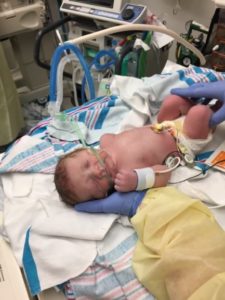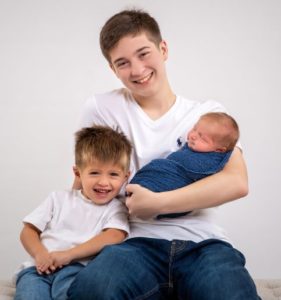Couple experiencing early pregnancy loss learns the cause is a uterine septum

Prairieville couple enduring a complicated delivery and miscarriages caused by a uterine septum find answers at Fertility Answers.
In October 2016, Cassidy woke to intense pain and a sense of something terribly wrong with her 36-week pregnancy. She was able to wake her husband Kevin just before passing out who immediately saw the significant blood loss from his pregnant wife. The rest of what happened that night Cassidy learned only later when she came out of recovery.
Kevin wasted no time getting Cassidy to Woman’s Hospital, driving at breakneck speed from their Prairieville home to get her medical help. At the hospital they discovered Cassidy had a placental abruption, which occurs when the placenta partially or completely separates from the inner wall of the uterus before delivery. Placental abruption is an uncommon but serious and life-threatening complication of late trimester pregnancy that can block the baby’s supply of oxygen and nutrients and cause heavy bleeding in the mother.
The doctors at Woman’s Hospital quickly performed an emergency C-section to deliver Cassidy’s unborn baby and to stop the bleeding from her placenta. Their newborn baby boy, Everett, deprived of oxygen during the crisis, required oxygen and would end up staying 12 days in the neonatal intensive care. Cassidy lost so much blood she required two blood transfusions.
After Everett was born, Cassidy again got pregnant in 2017 and 2018, but both pregnancies ended in early miscarriages at around 11 weeks. “I’ll admit that we both had a little PTSD from what happened in 2016, especially Kevin,” said Cassidy. “But we really wanted more children.” Being careful with both subsequent pregnancies, she talked frequently with her obstetrician. After the second miscarriage, her doctor decided it was best for her to see a specialist and referred her to Dr. Neil Chappell at Fertility Answers in Baton Rouge.
“We love Dr. Chappell,” she said. “He really made us feel like we were the only patients he had.” His thoroughness impressed the couple as he painstakingly went through all her previous medical history and lab tests to try to discover what could be causing her to miscarry.
When pregnancy loss happens multiple times in a row, there could be an unseen fertility issue
After additional testing, Dr. Chappell felt certain that the cause of Cassidy’s miscarriages had something to do anatomically with her uterus. A surgical hysteroscopy performed the following week revealed that she did indeed have a uterine septum which he removed with a simple surgical procedure.
A uterine septum occurs when a full or partial wall separates the uterus. This condition is congenital, meaning it occurred during Cassidy’s own early development as a fetus. A uterine septum does not typically affect a woman’s ability to conceive, but it does significantly increase her risk of a miscarriage as it did in Cassidy’s case.

While Cassidy and her doctors can’t conclusively link her 2016 placental abruption to the uterine septum, uncommon uterine anatomy like a septum is a known risk factor. Two weeks after surgery, Cassidy was pregnant again and after an uneventful pregnancy in which she was diligently followed by a maternal fetal expert, Griffin was born on August 9, 2019 joining his older brothers Jace and Everett.
“We are forever grateful to everyone at Fertility Answers, especially Dr. Chappell,” says Cassidy. “We have our beautiful baby boy because of everything he did for us.”
From talking about their experience with friends, the couple concedes that there is a lot of misconception that a trip to a fertility specialist will always lead to expensive fertility treatments. “In my case, the cause was something simple and easy to fix in surgery,” she says. “We have encouraged many of our friends who are struggling with infertility or miscarriages to see a doctor. We tell them their problem may not necessarily lead to having to do IVF.”


